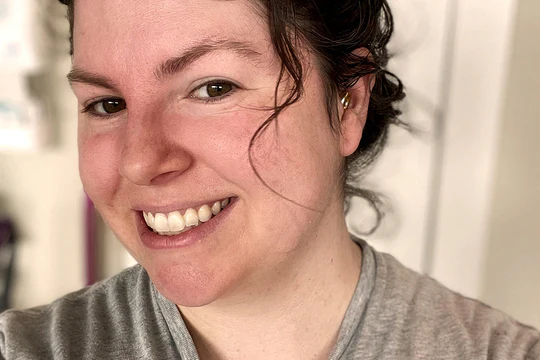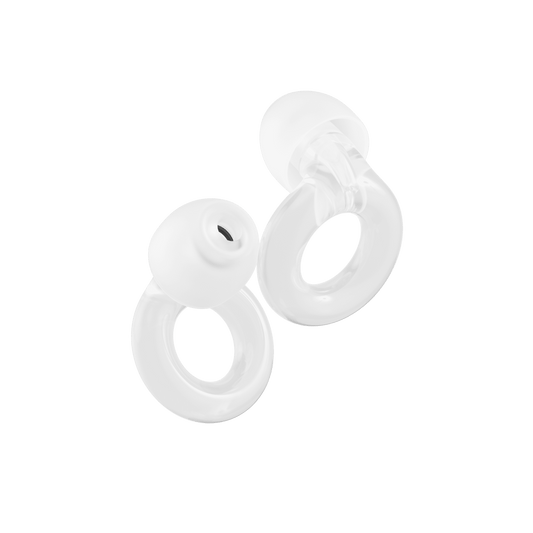For most people, sleep is a pleasant time of the day. Eight hours of resting and recharging for the day ahead. But for light sleepers, sleep is far from enjoyable. And feeling ‘recharged and ready to go’ in the morning is nothing but a distant memory.
Maybe it’s a loud bus hissing to a stop outside your window, rudely intruding on your peaceful slumber. Or your partner snoring like a freight train while you lie awake staring at the ceiling. Even the chirping morning birds outside your window become a daily annoyance.
If any of this rings true, you may be a sensitive sleeper. And if that’s the case, then noise is your nemesis.
And let’s face it, when you’re a light sleeper, sleeping with noise – any noise – is tough.
We’re leading increasingly busy lives, with jam-packed schedules. So the need to feel rested, energized, and motivated for the day ahead is more vital than ever. And quality sleep is essential – both for our physical and mental well-being.
In this article we’re taking a closer look at how we can block out noise while sleeping to get the restorative sleep we need to keep ourselves happy and healthy.
Let’s dive right in…
Our brains are hardwired to notice noise
It all started thousands of years ago, with our earliest ancestors.
While sleep was necessary for their survival, it was also a time of great vulnerability. They had to be on red alert to the many dangers they faced, like predatory animals, harsh weather conditions, and imminent threat from other tribes. For our ancestors, noise was a huge ally.
Of course, the struggles we face on the daily aren’t typically of the same threat level, but the process in our brains still exists and works the same.
Which means, yes, we’re hardwired to wake up when we hear noise. And that’s not great news for the sensitive sleepers among us.
What are common noise disruptors?
The world can be noisy, even at night. Especially if you live in a busy city.
Here are some of the most common sleep disruptors:
Natural noise
- Animals – Dogs barking, morning birds, loud foxes
- Weather – Thunderstorms, strong winds, heavy rain
Home noise
- Household appliances (such as washing machines)
- Floorboards creaking
- Doors slamming
Transport noise
- Cars
- Planes
- Trains
- Motorbikes
Human noise
- Snoring
Snoring is considered “consistent noise”, and it can be one of the worst noise disruptors there is (and one of the most common). This is because it makes it extremely difficult to fall asleep as your brain never has the chance to break away from the snoring sound.
- Noisy neighbors
There’s nothing more frustrating than being woken up by a loud party. Or maybe it’s their booming voices or footsteps. Noise from your neighbors can be infuriating, and with tempers on the edge, it can often lead to ongoing conflict.
It’s important to note that if you have misophonia or noise sensitivity, it’s likely that consistent noise is going to be a bigger disruption for you than other people.


How does a lack of sleep affect you?
Well, there’s the obvious one: you’re tired. Which in itself is a struggle. But when you couple tiredness with serious stress, increased irritability levels, and even disorientation – the busy day ahead can feel like an impossible mountain to climb.
Other effects of a lack of sleep include:
- A weakened immune system
If your sleep is disrupted, it can have a direct effect on your immune system, so you'll be more at risk of catching viruses and infections.
- Becoming more accident-prone
When you’re feeling sleepy, it can affect your judgment and reaction times, leaving you more prone to accidents. These could include things like car accidents, trips, falls, etc.
- Problems with memory
When you’re asleep, your brain is still hard at work. It’s busy forming connections that help to process and store information. So when this process is constantly being interrupted, the connections stop, which affects your memory and concentration.
- Diabetes
Surprisingly, sleep deprivation can often lead to the development of diabetes.
Firstly, when you’re tired, you can neglect exercise, and your craving for junk food will become more intense. Both of these are major risk factors for weight gain and type 2 diabetes.
Secondly, sleep deprivation can interrupt your digestive processes. When you’re asleep your body is working to regulate the hormones that control hunger and “feeling full”. If these are thrown out of the window, then you’re likely to snack more, leading to blood sugar spikes. Increased snacking can also lead to obesity and weight gain.
- Cardiovascular issues
If you struggle with sleep deprivation long-term, there’s no doubt that your heart and cardiovascular system will suffer. You’re more likely to develop high blood pressure and heart disease, which can increase your likelihood of a heart attack or a stroke.
Sleep is crucial for keeping your heart healthy. Without it, your body can struggle to regulate your internal systems.
- Mood disorders
Yes, without sleep you’re cranky. Who knew? But did you know the development of mood disorders is one of the first symptoms to appear?
We all know that one night of poor sleep can make us irritable and less able to regulate our emotions. But long-term sleep deprivation can lead to more serious effects, such as anxiety, depression, intense anger, and increased impulsivity. And if you already suffer from mental health conditions, sleep deprivation can intensify the severity of those symptoms.


How to improve your sleep
Although it can seem impossible, blocking out noise while trying to sleep is more achievable than you think.
Here are our 7 tips on how to block out noise when sleeping, and other tips to improve your nighttime sleep:
1. Get soundproofing
We’ve all wondered how to block out noise when trying to sleep. It can be tricky because sound can find its way through the smallest of gaps.
And because fully soundproofing a room can be costly and take a lot of time, there are some quick fixes you can do to reduce the external sound coming in:
- Seal all gaps and cracks
Check window frames, door frames, floorboards, and skirting boards and seal them using an appropriate acoustic sealant, if possible. You can also try rolling up a towel or other suitable material and placing it at the bottom of your bedroom door.
- Hang heavy curtains or drapes
Heavy material hung on the windows can be ideal for soaking up unwanted sound. You could even try hanging wall drapes over the offending wall. Using material as a barrier can be hugely effective to block sound while sleeping.
They exist! And they’re revolutionizing sleep for light sleepers out there.
What’s more, not only do they block out noise when you’re sleeping, but they also block out light from street lamps or the early morning sun – win-win!
- Create a barrier
Put something solid between you and the noise, like a bookshelf unit, your wardrobe, cupboards – anything that will work as a barrier to dull the noise of your partying neighbor or loud housemate.
2. Block it out with noise-reducing earplugs
Investing in some noise-reducing earplugs is one of the most efficient ways to block noise while sleeping.
Earplugs like Loop Dream™ are specifically designed for sleep. Every feature is made with sleep in mind to help you enjoy your dreamiest night ever. The innovative body of the earplug reduces pressure for added comfort – even if you sleep on your side. Additionally, the hybrid memory foam and silicone ear tips follow the natural shape of your ear for a snug fit and all-night comfort. Plus, they offer our most powerful noise reduction of 27 dB (SNR), muffling nighttime noises like snoring and traffic with 27 dB for a better sleep.
For more information on earplugs to help you sleep, check out our blog post here.
3. Communication is key
People live their lives differently.
Some are early risers, some are night owls, some work night shifts, and some love to party.
Whatever the situation, you may find that having a constructive conversation with the people involved works wonders. Maybe even a little negotiation might be the key.
Let them know that their noise is affecting your sleep and impacts well-being.
Always try to keep calm and be reasonable. The solution may be simpler than you think and surprise you both.
If your neighbor is a fan of loud music, resist the temptation to blast it back at them at an ungodly hour. It may give you the brief relief of satisfaction in the moment, but in the long run it’s better for your brain (and the situation) to keep it civil.
4. Report it
It may sound dramatic, but if the polite conversations aren’t working, contacting your local authority may be the next step to take.
Looking up your local laws on sound can help you get clued up to ensure you have precedent for your complaint. You can find out what time builders are allowed to start using power tools, what time fireworks can go on till, or how late music can be played online.
If you’re in rented accommodation, it may also be worth checking if the soundproofing in your building meets building regulations.
10M+ happy customers
Our earplugs
5. Rearrange your room
Time to channel your inner feng shui.
If you can’t sleep due to noise and your bedroom is on a main road, try moving your bed to the other side of the room. If it’s next to the shared wall where a screaming toddler’s throwing tantrums in the next room over, move it. Or if your bed is sitting on creaky floorboards…
You get the picture.
A simple shuffle around of your bedroom could mean you’re on the way to that bit of peace and quiet you’re craving when it’s time to close your eyes.
And if you have a spare room, try sleeping in there for a night to see if it’s quieter. You may find that a room swap may be just what the doctor ordered.
6. Look after your mind
Sleep issues can often result in high levels of stress.
Stress that often goes hand in hand with unhealthy thought patterns and cycles.
This will leave you worrying that you can’t sleep. And then you can’t sleep because you’re worrying. It’s an exhausting cycle to even think about, right?
Think about it: What are the chances of falling asleep when you’re anxious or angry? Probably pretty slim.
Relaxation methods, like mindfulness and meditation, can take the edge off the anger and reduce the negative thoughts. They’re particularly useful if you’re prone to stress and anxiety.
So start to use your mind to control your negative thoughts, and with practice and patience, you can become much more tolerant of the noise that’s bothering you.
When that rowdy party is happening late at night, you might be more equipped to remind yourself that it doesn’t happen every night. Just focus on your breathing, and redirect those angry thoughts.
7. Get exercising
It’s a fact – you sleep better when you’re physically tired. The link between exercise and deeper sleep has been studied extensively.
If you go to bed with excess energy to burn, it’s not going to help. So try fitting in a workout 2-3 hours before bedtime. Maybe a swim, a bit of yoga, or even a walk. They’re all great ways to blow off some steam and prepare your body for sleep.
Key takeaways
Life is noisy. And if you’re a sensitive sleeper, battling noise can be a challenge and make sleep feel impossible.
Long-term sleep deprivation can have serious effects on your mental and physical well-being, leading to issues such as cognitive impairment, mood disorders, and heart problems.
Common noise disruptors can include natural, transport, and human noises as well as noises in the home such as appliances and creaking floorboards.
What’s the best way to block noise while sleeping? Luckily, there are many things you can do, such as soundproofing, moving your bedroom around, or meditating.
Using noise-reducing earplugs is an ideal way to get some much-needed shuteye. Reusable and made from our softest silicone, Loop Dream earplugs are made for maximum sleep comfort – even if you sleep on your side.
Frequently Asked Questions
Why does noise affect sleep even when it doesn’t wake you up?
Because your brain keeps processing sound during sleep. Even if you don’t fully wake up, noise can interrupt deeper sleep stages and reduce recovery.
Are sudden noises worse than constant background noise?
Yes, irregular sounds are more disruptive. Sudden changes in volume or pitch trigger alert responses that fragment sleep more than steady noise.
Can blocking noise improve sleep depth, not just sleep duration?
Yes, reducing noise helps the brain stay in deeper sleep phases for longer. This supports more restorative sleep, even if total hours stay the same.
Why do some people become more sensitive to noise at night?
At night, the brain lowers visual input and relies more on hearing. This heightened sensitivity makes small sounds feel louder and more intrusive.
Is it better to block noise or mask it?
It depends on the sleeper. Some people prefer reducing noise directly, while others sleep better with consistent sound that masks disruptions.
How does noise reduction support falling asleep faster?
Lower noise levels reduce mental alertness. When the brain isn’t reacting to external sounds, it can shift into sleep mode more easily.
Can blocking noise help people who wake up multiple times per night?
Yes, especially if awakenings are linked to environmental sounds. A quieter sleep setup helps maintain more continuous sleep cycles.
Why does noise feel more disruptive in shared bedrooms?
Because sounds are unpredictable. Breathing, movement, or external noise filtered through another person’s sleep pattern increases nighttime interruptions.
What should you look for in a noise-blocking sleep solution?
Comfort, moderate noise reduction, and long-wear safety matter most. Over-blocking sound or using uncomfortable materials can backfire.
Is blocking noise a long-term sleep strategy?
Yes, when used thoughtfully. Creating a quieter sleep environment supports healthier sleep patterns over time without relying on medication.

How To Deal With A Crying Baby
Discover effective strategies to soothe a crying baby, ensuring their comfort while maintaining your calm. Essential ...

Sensory overload and kids during COVID - testimonial
COVID-19 has us all locked up inside, combining parenting, relation and work with little distraction. Sensory overloa...

The Impact of Noise Sensitivity on Daily Lives: Unveiling the Statistics
There are as many as 6 million people with noise sensitivity in the UK We conducted a survey to ask “How much of a...


















